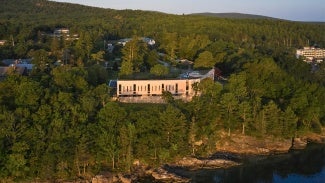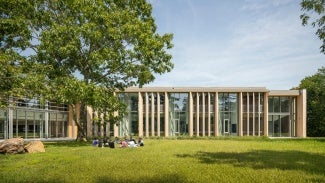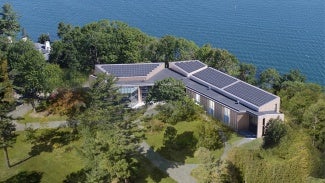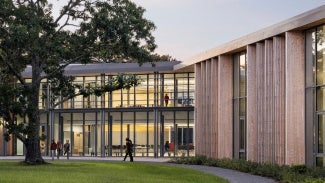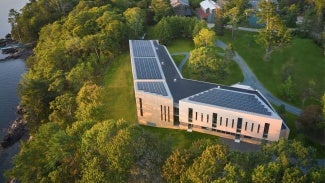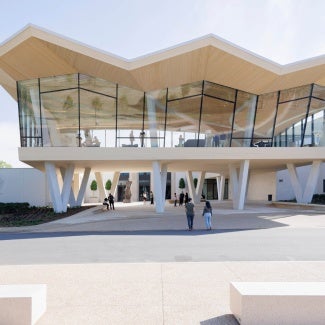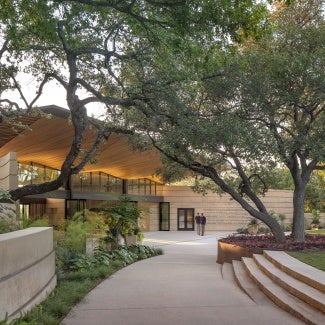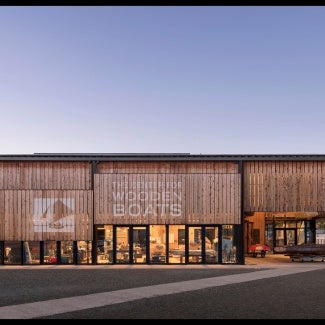Center for Human Ecology, College of the Atlantic
The Center for Human Ecology at the College of the Atlantic has been honored for its outstanding architectural design by The American Institute of Architects (AIA) for its exceptional architectural design, which exemplifies sustainable design and environmental responsibility.
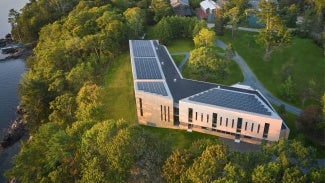
Project highlights: Center for Human Ecology, College of the Atlantic
- Architect: Susan T. Rodriguez and OPAL
- Owner: College of the Atlantic
- Location: Mount Desert Island, Maine
From its perch on a rocky promontory along the rugged coastline of Mount Desert Island, Maine, this new building for the College of the Atlantic was inspired by the institution’s focus on hands-on engagement with the natural world. Founded in 1969, the college was the first in the nation with a vision centered on the holistic study of humans’ relationship with the environment. The design for the Center for Human Ecology broadcasts the college’s mission and commitment to stewardship while also heightening awareness of the site’s unique ecology.
The center’s overall configuration frames a new campus landscape, protecting the space from the prevailing and harsh ocean winds and optimizing solar gains to mitigate heating demands prompted by the region’s long, dark winters. A series of spatial cuts through the building offer views of the college’s namesake Atlantic Ocean, allowing its interior spaces to connect directly with the inspiring coastline.
It features a network of functional and flexible spaces, including art studios, laboratories, research spaces, and a greenhouse. Faculty offices and multipurpose classroom spaces for lectures and exhibitions underscore a learning community free of departmental divisions. The center also includes generous public spaces that allow it to host public programs throughout the year.
The team relied on a palette of locally sourced materials for the center’s nearly all-wood structure and an exterior envelope that evokes the history and culture of the working waterfront. In addition, that strategy has reduced the building’s life cycle carbon footprint, effectively neutralizing the environmental impact of its construction. The pitched roof that crowns it contains three articulated classroom volumes and provides the optimal angle and orientation for the photovoltaic arrays that offset the center’s energy use. Constructed to align with Passive House standards for energy efficiency and indoor air quality, the new center uses 89% less energy than code-compliant buildings of comparable size and program, ensuring the long-term sustainability of the college’s campus.
The center’s two wings frame a new outdoor gathering space that preserves a grand, mature oak tree at its center. Throughout the project, the team also worked closely with the campus horticulturalist to identify and protect 41 specimen trees and incorporate low-maintenance plantings to create a resilient landscape that supports a diverse range of species. Exterior lighting was kept to a minimum to align with the college’s dark sky standards, while bird-safe glass protects local and migratory bird populations without sacrificing inspiring views. In addition, the center houses the Acadia National Park Herbarium, which contains more than 15,000 specimens from around the region.
As a whole, the center’s design is reflective of the college’s unique character and culture, both defined by simplicity, pragmatism, and a commitment to foregrounding the natural world. Weaving together the study of human ecology and environmental sustainability, it stands as a dynamic academic venue that amplifies immersive learning experiences at the intersection of land and sea.
Project team & Jury
Darron Collins, President, College of the Atlantic
Associate Architect: OPAL
Engineer - Structural: Silman
Engineer - MEP: van Zelm Engineers
Landscape Architect: Michael Boucher Landscape Architecture
Lighting Designer: Brandston Partnership Inc.
General Contractor: E.L. Shea
Norio Tsuchiya, AIA, Chair, Devenney Group, Ltd., Architects, Phoenix
Teonna Cooksey, Columbia Graduate School of Architecture, New York
Nolman Davis, Assoc. AIA, Eppstein Uhen Architects, Milwaukee
Collete English Dixon, Roosevelt University, Chicago
Mollica Manandhar, AIA, Payette, Boston
Jerryn McCray, AIA, Jerryn J. McCray, Architect, Baltimore
Annya Ramirez-Jimenez, AIA, Marvel Architects, New York
Yimeng Teng, AIA, Ro | Rockett Design, Los Angeles
The 2024 Architecture program celebrates the best contemporary architecture regardless of budget, size, style, or type. These stunning projects show the world the range of outstanding work architects create and highlight the many ways buildings and spaces can improve our lives.
Thirteen projects showcase the best contemporary architecture.

